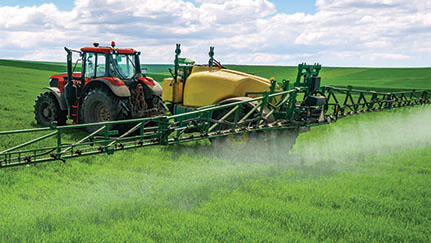Mid-sized and large farmers are increasingly buying sprayers and applying their own herbicides, pesticides and fungicides. With the substantial investment a self-propelled sprayer requires, it can be tempting to look for additional acres. So when a neighbor has a field that needs spraying, it can be seen as an easy opportunity to put the equipment to work and earn some extra income.
Unfortunately, this “neighborly thing to do” isn’t without risk. Unlike other custom field operations like tillage and seeding, spraying has unique, potentially costly liabilities. A crop application accident, such a misapplication or chemical drift, can cause crop damage, degrade surface water quality, harm human health and more — exposing the chemical applicator to potentially massive liability.
Effective communication is key
One of the best ways to protect yourself and your neighbors is by thoroughly documenting the details before, during and after the application is to be made. If you’re planning to spray another farmer’s fields, effective communication between you and the other farmer is key in helping prevent misapplications. Be sure to take good notes and ask for specific details and expectations from the farmer. Such documentation can help prevent miscommunication in the case of a misapplication and may contribute to a quicker resolution.
“Create written documentation on the field, crop and chemical being applied,” said Nationwide Staff Underwriting Consultant Michael Johnson. “When the wrong product is applied and crop is damaged as a result, it can quickly turn into a shouting match if there’s no written record. Documentation is important and likely required by law.” Find out more ways to help prevent crop application accidents.
Proper insurance is a must
Before even turning a wheel in your sprayer, make sure you’ve got the right farm insurance protection in place. “Spraying losses are typically not covered under a standard farm insurance policy. It’s especially important to have the proper endorsements added with the right limits in place suitable to the applications you’re conducting,” Johnson said. “You should also check with your state’s department of agriculture, as recordkeeping and license requirements vary by state.”
Before spraying your own fields or on a custom basis for another farmer, check your farm insurance policy and/or talk with your agent to verify coverage is in line with the fieldwork you’re doing. That includes having the right policy limits in place.
“It’s a good idea for your agent to know when you’re applying chemical to your own fields or if you’re spraying on a custom basis,” Johnson said. “Compared to spraying on your own farm, you have more exposure with custom applications because you’re going into an area with which you’re not as familiar.”
If a spray accident or incident occurs
If you suspect a chemical misapplication or other crop application accident, contact your farm agent as soon as possible to enable him or her to work with agronomists to confirm any potential claims and expedite a resolution.
“Claims involving chemical misapplications should be reported as soon possible,” Johnson said. “Nationwide has agronomists on staff as part of claims department and when necessary, they can assist on claims and assessing liability and damages.”
